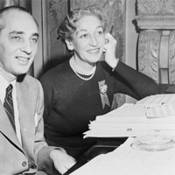
By New York World, [ Library of Congress Prints and Photographs Division.](http://hdl.loc.gov/loc.pnp/cph.3c21178 - Public Domain
Dorothy Fields
Librettist, Lyricist
Biography
Dorothy Fields
Dorothy Fields (July 15, 1905 – March 28, 1974) was an American librettist and lyricist.
She wrote over 400 songs for Broadway musicals and films. Along with Ann Ronell, Dana Suesse, Bernice Petkere, and Kay Swift, she was one of the first successful Tin Pan Alley and Hollywood female songwriters.
Fields was born in Allenhurst, New Jersey, and grew up in New York City.
Her father, Lew Fields, an immigrant from Poland, was a vaudeville comedian and later became a Broadway manager and producer.
In the 1920s she spent time in London United Kingdom, where she appeared in a regular slot at the "Midnight Follies" as one half of a successful cabaret comedy act "Silly and Dotty" with the famous English socialite Lady Sylvia Ashley, at the London Metropole.
Fields's career as a professional songwriter took off in 1928, when Jimmy McHugh, who had seen some of her early work, invited her to provide some lyrics for him for Blackbirds of 1928. Fields and McHugh teamed up until 1935. Songs from this period include "I Can't Give You Anything But Love", "Exactly Like You", and "On the Sunny Side of the Street." During the later 1920s, she and McHugh wrote specialty numbers for the various Cotton Club revues, many of which were recorded by Duke Ellington.
In the mid-1930s, Fields started to write lyrics for films and collaborated with other composers, including Jerome Kern. With Kern, she worked on the movie version of Roberta, and also on their greatest success, Swing Time. The song "The Way You Look Tonight" earned the Fields/Kern team an Academy Award for Best Original Song in 1936.
Fields returned to New York and worked again on Broadway shows, but now as a librettist, first with Arthur Schwartz on Stars In Your Eyes. (They re-teamed in 1951 for A Tree Grows in Brooklyn.) In the 1940s, she teamed up with her brother Herbert Fields, with whom she wrote the books for three Cole Porter shows, Let's Face It!, Something for the Boys, and Mexican Hayride. Together, they wrote the book for Annie Get Your Gun, a musical inspired by the life of Annie Oakley. They intended for Jerome Kern to write the music, but when he died, Irving Berlin was brought in. The show was a success, and ran for 1,147 performances.
Shows
Shows associated with Dorothy Fields
Songs
Songs from shows associated with Dorothy Fields
Videos
Videos associated with Dorothy Fields
Quizzes
Quizzes associated with Dorothy Fields
Learning Modules
Learning modules associated with Dorothy Fields
Additional Information
N/A